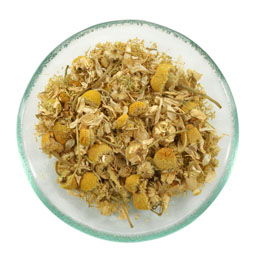Chamomile is a diversely useful herbal medication that is used all over the world. This article discusses the side effects of using this herb.

Chamomile is a flowering plant which is found most commonly in Germany and Hungary. The dried flower heads of this plant have been extensively used to make herbal tea by Europeans and others all over the world. Due its medicinal properties, chamomile is widely used in manufacturing tinctures, ointments, dietary supplements, oils, creams, etc. One of the benefits of this herb is that it provides relief in cases of minor illnesses and stomach upsets. Although considered healthy, it has been found to have some side effects.
Known Side Effects
As chamomile is a flowering plant belonging to the daisy family, people who are allergic to daisies might experience allergic reactions. The problem with allergies is that you never know you're allergic to something until you actually get a very telling reaction. Similarly, if you are allergic to chamomile, you probably will not know about it, till you actually consume it and experience these side effects firsthand. While rashes and itching are the most common symptoms of an allergy; in more serious cases, you might also suffer from anaphylaxis. Throat swelling and shortness of breath are also some of the side effects. Eye inflammation has been reported quite often when people have come in contact with the herb.
If you consume too much of chamomile, you might end up feeling slightly sedated, and it is not recommended that you drive or operate heavy machinery in this drowsy condition. An excess dosage may also induce vomiting and dizziness. These problems can also be seen in young infants and newborns who may face a problem of botulism.
One more thing to keep in mind is that if you are on any medication, their effects may be hampered or diluted by the consumption of this herb. Consuming chamomile is especially risky, if you are on a blood-thinning medication like coumadin. This is because one of the active ingredients in chamomile, called 'coumarin', may have negative effects on those who are on blood-thinning medication. The herb has also shown effects on blood sugar levels and blood pressure in those who are suffering from these problems. Pregnant women should also avoid chamomile as it may cause miscarriage. It is also advised that breastfeeding mothers refrain from consuming this herb.
Chamomile is in fact a great substance which helps ease a lot of problems related to stomach upsets, minor illnesses, and menstrual cramps, but like any other medication, caution must be exercised when it is consumed. Being a herbal supplement, its side effects are quite rare, but that does not mean that you are allowed to be a little irrational while consuming it. Like any herbal medicine, it is essential that you ensure what dosage is safe for you.
Disclaimer:
This Buzzle article is for informative purposes only, and should not be used as a replacement for expert medical advice.






 Chamomile is a flowering plant which is found most commonly in Germany and Hungary. The dried flower heads of this plant have been extensively used to make herbal tea by Europeans and others all over the world. Due its medicinal properties, chamomile is widely used in manufacturing tinctures, ointments, dietary supplements, oils, creams, etc. One of the benefits of this herb is that it provides relief in cases of minor illnesses and stomach upsets. Although considered healthy, it has been found to have some side effects.
Chamomile is a flowering plant which is found most commonly in Germany and Hungary. The dried flower heads of this plant have been extensively used to make herbal tea by Europeans and others all over the world. Due its medicinal properties, chamomile is widely used in manufacturing tinctures, ointments, dietary supplements, oils, creams, etc. One of the benefits of this herb is that it provides relief in cases of minor illnesses and stomach upsets. Although considered healthy, it has been found to have some side effects.